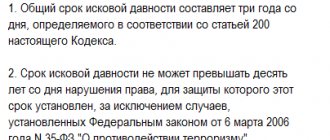18
To submit documents, heirs are given 6 months from the date of death of an individual. If you do not enter into an inheritance after six months, the recipient loses the right to claim the property of the deceased.
However, sometimes relatives do not know about the death of a person or are physically unable to visit the notary. In this case, it is possible to restore the terms through the court. Interested persons need to apply within 6 months after the end of the reason for absence.
What to do if the deadline for entering into inheritance by law has been missed
Entry into inheritance according to the law in accordance with Art. 1141 of the Civil Code of the Russian Federation is carried out in order of priority. The law establishes the procedure for a notary if the heir does not submit an application for inheritance in a timely manner.
In such situation:
- the property is divided among other heirs of this line;
- the property is transferred to the next heirs;
- in the absence of recipients, the property is transferred to the ownership of the state.
Inheritance by adopted children and adoptive parents according to Article 1147 of the Civil Code of the Russian Federation is similar to blood relatives.
With a will or without a will, is there a difference?
In a broad sense, it does not matter whether the period of inheritance by law or by will has been missed. The main consequence is the loss of rights to the property of the deceased.
If the deadline for the will is missed, then the right to the property of the testator passes to the heirs by law. If the inheritance period by law is missed, the rights are transferred to other first-priority recipients.
And if there are no heirs of this priority, the property is transferred to recipients of another priority.
The order of succession according to the law according to Art. 1142 – 1145 of the Civil Code of the Russian Federation is established from close relatives (husband, wife, children, parents) to nominal ones (stepfather, stepmother).
Ways to restore deadlines
Let's look at how to register an inheritance.
There are two ways to enter into inheritance rights when deadlines are missed:
- Go to court.
- Agree with relatives.
Important! Litigation is inevitable if the heirs do not want to go to the notary again. The claim is filed within 6 months after the end of the reasons for absence.
Valid reasons for absence
Reasons that did not depend on the will of the heir are considered valid.
Good Reason Options
| No. | Situation | Possible reasons |
| 1 | Lack of information | The recipient did not know the testator |
| The heir did not know about the death of the owner | ||
| The citizen did not know about the existence of a will | ||
| 2 | Legal insolvency | Recipient's incapacity |
| Recipient's limited legal capacity | ||
| Minor age | ||
| 3 | Health status | Long-term illness |
| Injury | ||
| Surgical treatment | ||
| 4 | Territorial separation | Business trip |
| Completion of military service | ||
| Living in another country |
What to do if there are no good reasons
The absence of the listed valid reasons is not a basis for the heir’s inaction. In some cases, the court may accommodate the potential recipient.
The law does not establish a list of valid reasons. Therefore, the issue is considered on an individual basis.
Important! The court will examine the circumstances of the case and make a decision based on the specific situation.
Valid reasons for absence
The court will not reinstate the term without good reason.
Therefore, the plaintiff will need to prove that the late application was justified. Reasons that may be taken into account include the following:
- The plaintiff was not notified of the death of the testator. He may not have communicated with his relative and did not know his address. If this fact is proven, the judge may extend the period for applying for inheritance.
- The testator goes missing. It is required to prove that the whereabouts of the deceased were unknown, but there was no official notification of this. The successor, in this case, does not know about the beginning of the period for entering into inheritance.
- Applying for the inheritance was impossible for medical reasons. During the period established by law, a citizen could be under serious treatment, could not move, or be in a coma.
- The presence of a citizen abroad. During the period of inheritance, he could have been in another country and had no opportunity to get home due to lack of a visa or deportation.
- Staying in prison. Some correctional institutions do not allow prisoners to meet with a notary.
All reasons are considered by the court individually. The law does not provide a list of valid reasons. Specific circumstances will be taken into account.
Restoring a missed deadline for accepting an inheritance through the court
In order not to permanently lose the right to property, a citizen should go to court. In accordance with paragraph 40 of the Resolution of the Plenum of the Armed Forces of the Russian Federation No. 9 dated May 29, 2012, the issue is considered exclusively in the manner of claim proceedings.
In the absence of heirs - individuals or organizations, the recipient of the property is the state.
Algorithm for restoring the period of inheritance:
- Collection of documents.
- Drawing up an application.
- Payment of duty.
- Submitting an application.
- Trial.
Collection of documents
The list of papers depends on several factors:
- type of legal proceedings;
- number of applicants for property;
- reasons for missing deadlines for filing an application.
The minimum list of papers should include:
- death certificate of a citizen;
- papers confirming the plaintiff’s relationship with the deceased person (in case of inheritance by law);
- documents on the property of the testator;
- evidence of valid reasons for absence;
- report on the value of the inheritance;
- written refusal of the notary;
- original administrative document;
- receipt of payment of duty.
Additional papers are submitted based on the life situation of the heir.
Drawing up an application
Below is a standard form of a claim for restoration of the period for accepting an inheritance.
More information about the rules for filing a statement of claim can be found in the article: “Statement of Claim for the restoration of a missed deadline for accepting an inheritance in court.”
Payment of duty
The state fee must be paid not only when performing notarial acts, but also when filing an application with the court. Its size is determined by the Tax Code.
The heir will have to pay a substantial amount for filing a claim. The amount of the fee depends on the size of the claim.
Duty calculation
| No. | Value of inherited property | Amount of duty |
| 1 | up to 20,000 rub. | 400 rub. |
| 2 | 20,000 rub. – 100,000 rub. | 800 rub. + 3% of the claim price |
| 3 | 100,000 rub. – 200,000 rub. | RUB 3,200 + 2% of the claim price |
| 4 | 200,000 rub. – 1,000,000 rub. | RUB 5,200 + 1% of the claim price |
| 5 | from 1,000,000 rub. | RUB 13,200 + 0.5% of the claim price |
| 6 | Maximum cost | 60,000 rub. |
Example. After the death of my father, I was left with a one-room apartment in a former hostel and an old minibus. The direct heirs of the deceased person are a daughter who lived in the same city as him, and a son who lived in another region of the country. Relations between the heirs were strained, so the testator’s daughter hid the fact of death from her brother. The son learned about his father’s death by accident, when he had to be deregistered from the military registration and enlistment office. At that time, more than 9 months . Having contacted the notary, the heir received a written refusal. The reason is that the deadline for submitting an application was missed. The heir had to prepare papers for the court. My son's interest was in a minibus. The proceeds from its sale should have been enough to open a small business. He did not apply for an apartment. The total value of the property at the time of the trial was 950,000 rubles. The amount of claims is 475,000 rubles. To file a claim you had to pay 7950 (5200 + 2750) rubles. However, when the sister found out about her brother's intentions, she gave him the vehicle. The case did not go to court.
Expert opinion
Stanislav Evseev
Lawyer. Experience 12 years. Specialization: civil, family, inheritance law.
The main part of the costs usually falls on the payment of state duties. However, when going to court, the heir will also have to prepare the relevant documents. If necessary, you should hire a lawyer to participate in the hearing. One of the main documents is the assessment of inherited property. On its basis, the state duty is calculated when filing a claim.
Detailed information about the costs of entering into an inheritance can be found in the article: “How much does it cost to enter into an inheritance: costs and expenses.”
Submission of documents
The hearing of the case is carried out exclusively within the framework of the claim proceedings, even if there is a single heir.
Documents are sent to:
- at the place of residence of the defendant/one of the defendants (if there are other heirs);
- the location of his property (if there are several defendants or one of the items of inheritance is a real estate property);
- at the place of residence of the plaintiff (if the defendant is the state).
Arbitrage practice
Courts have different views on the issue of inheritance. Quite often they refuse to satisfy citizens' claims. The main reason is lack of proper evidence. However, there is also positive judicial practice.
Example. The plaintiff appealed to the court with a request to restore the terms of inheritance. The applicant also asked the court to recognize her as having accepted the property under the will. The woman claimed that she contacted the notary after the established deadlines. But in fact, the deadline was only 1 day overdue. In this case, there was an actual entry into inheritance of a residential building and land plot. The problem arose with a bank deposit and a lost pension, which she could not receive without an inheritance certificate. Other heirs do not lay claim to her mother’s property and do not make independent claims. The court satisfied the stated requirements (Decision of the Velsky District Court of the Arkhangelsk Region dated December 26, 2012, case No. 2-1821/2012).
In most cases, the plaintiff cannot prove the existence of valid reasons for missing the deadline for entering into inheritance, so the court refuses to satisfy the claim.
Example. The plaintiff applied to the court to restore the time limit for entering into inheritance. In support of her claims, she explained that her mother died when she was a minor. The applicant's grandmother and sister submitted an application to a notary to open an inheritance case. The notary promptly notified the legal representative about the opening of the case.
The plaintiff's mother was deprived of parental rights. Therefore, the plaintiff was under the supervision of a boarding school at the time of her mother’s death. The girl knew that her mother died from school.
After reaching 18 years of age, she did not apply for inheritance due to legal illiteracy.
The court refused to restore the term to the citizen, since she was notified in a timely manner of the death of her mother; other heirs, when filing the application, indicated the plaintiff among the heirs. However, she did not express a desire to inherit, because she wanted to get an apartment as an orphan. (Decision of the Zavodsky District Court of Orel, Oryol Region dated February 27, 2018, case No. 2-533/2018)
When they refuse to reinstate the deadline
There is no evidence of impossibility of claiming inheritance
The most common grounds for refusal to satisfy claims:
- there is no argument that it was realistically impossible to assert a right to the property of the deceased;
- the heir knew about the inheritance, at first he did not want to enter (he did not participate in the preparation of documents, he even wrote an official refusal of the inheritance), but then he changed his mind.
In such circumstances, it is problematic to restore the term in court. When other relatives do not agree in writing to accept the “latecomer” into their ranks, the right to inheritance will be lost.
If 6 months have passed since the day the heir learned about the inheritance
If the application for restoration was sent to the court 6 months after the day when the valid reason ceased to be relevant, the period will not be restored. Conventionally, the period of 6 months for exercising one’s right as an heir is considered to begin from the day he learned about it.
For example , if the potential heir was employed abroad and therefore did not know about the day when the inheritance was opened (that is, the date of death of the testator). But after a certain time he returned to Russia, learned about the fact of death, and for six months after that he did not apply to the notary with the intention of accepting the inheritance.
When you are denied reinstatement of your deadline, you can file an APPEAL. In it, give your reasons and arguments about the validity of the reason. The appeal procedure for considering such cases is similar to the ordinary consideration of the case. In the second instance, the rules of claim proceedings are applied.
Do I need to contact a notary if there is a court decision?
If the heir went to court, then after receiving a court decision to restore the term, he will need to re-visit the notary and submit the relevant documents.
If the hearing of the case took place in the manner of claim proceedings, where the plaintiff made several demands, including a request for recognition of the right of ownership of property, then there is no need to contact a notary (clause 41 of the Resolution of the Plenum of the Armed Forces of the Russian Federation dated May 29, 2012 No. 9). Registration of ownership of property is carried out by court decision.
Choosing a method of protecting rights
The advantage of the first method is directness and unambiguity. The advantage of the second method is its informal nature, close to living conditions. The second method, based on a number of presumptions, “suffers” from its inherent refutability, since it is built on the interpretation of specific circumstances, often of a psychological or evaluative nature, which strengthens the element of discretion of the law enforcement officer and makes the outcome less predictable.
With a general understanding of the level of trust of citizens in the courts (and in general in the authorities in our country), it is necessary to recognize that we do not have other courts, so we will still have to go to court and take into account the current judicial practice.
This publication provides a brief overview of judicial practice in cases of restoring the period for accepting an inheritance and establishing the facts of accepting an inheritance, where the author mainly focused on negative decisions; it is better to learn from the mistakes of others.
It should also be taken into account that each specific life situation requires its own understanding and analysis. And judges, when evaluating evidence, are guided by their inner convictions and often make directly opposite decisions under similar circumstances.
Extrajudicial procedure for registering an inheritance if the deadline for entry has expired
The legislator has provided this method of solving the problem in the event that relatives can reach an agreement among themselves without judicial intervention.
For example, the applicant for the property will bear the costs of re-registration of documents. Or if, as a result of litigation, the costs of the heirs exceed the costs that they may incur when voluntarily submitting an application to a notary.
Important! The consent of relatives to include a new participant in their composition must be expressed in writing. The application can be submitted at any time after registration of the inheritance.
Algorithm of actions
If a citizen has learned about his rights to an inheritance, then he must initially contact other recipients for an out-of-court settlement. This option is beneficial not only for the new heir (no need to file a claim, go to court, or look for a lawyer), but also for those who have entered into an inheritance.
If the plaintiff's demands are satisfied, the citizen has the right to recover from the defendants all legal costs (fees, lawyer costs).
Algorithm of actions for the heir:
- notify all citizens who have inherited;
- draw up a written consent;
- collect documents for inheritance;
- pay the fee;
- contact a notary;
- obtain a certificate of inheritance rights and register property.
Important! An alternative to an out-of-court settlement is a written agreement. The parties independently determine the size of shares in the property of the deceased and redistribute it.
Notification of heirs
The citizen must conduct a conversation with the persons who entered into the inheritance. If there are good reasons for reinstating the deadline in court, it is enough to explain that the court will still satisfy the requirements.
Therefore, settling the issue without trial is more beneficial for everyone. To avoid litigation, the heirs may agree to re-register the inheritance.
Drawing up an application
The consent of the heirs to include another citizen among the heirs must be formalized in writing. Recipients must independently contact a notary and submit an application.
Important! The heirs should not indicate the reasons for their decision in the document.
The document form can be obtained from a notary.
Collection of documents
When contacting a notary, the recipient must have the following documents:
- passport;
- a will or documents confirming family ties.
Expenses
The costs of re-registration are distributed by the heirs independently. However, in most cases, the renewal fee is paid by the new heir.
Contacting a notary
When contacting a notary office, the notary must explain to the heirs the consequences of the decision made. After making sure that citizens understand that the amount of their property will be reduced or the right to inheritance may be completely lost, the notary collects certificates of inheritance rights.
The documents are stamped “Redeemed”. The notary issues new certificates of inheritance rights.
Deadlines
You can register a voluntary re-registration of an inheritance at any time after the death of the owner. The main condition is the consent of the other heirs. The law does not limit terms.
Is it possible to restore the term if you first refused the inheritance and then changed your mind?
If a citizen has submitted an application to a notary to renounce his share of the inheritance in favor of other heirs or without indicating specific persons, then it will no longer be possible to withdraw this application. The legislation of the Russian Federation does not provide for such a direct possibility.
In such a situation, only the rules of law on invalidating a unilateral transaction are applicable. That is, a citizen who has previously refused an inheritance has the right to challenge his refusal in court, if there are legal grounds for this. In particular, these are:
- Deception, misrepresentation, abuse of trust on the part of other heirs,
- Completing a transaction due to difficult life circumstances or under physical or psychological pressure.





